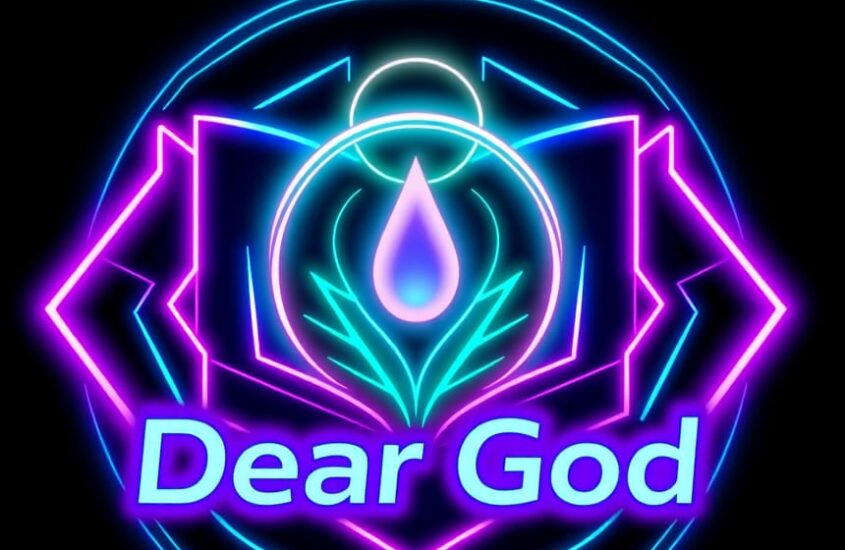Seeing the Not-Seen

Dear God,
Daddy! You missed me, right? (Long Laugh)
Dad, you missed me, admit it…. stop squeezing your face. I know how many people you sent to check up on me and find out why I didn’t write. (I knew you sent them)
I love you too…….I just wanted to breathe a little, but I am back.
So, where did we stop? Eehn, Dad, you see this world that you created for us eh…It is imilimious! (according to my mum).
Something happened and I began to question what drives the choices we make in life. How do we choose what we choose? I do remember a story my father told us one day.
Once upon a time in the belly of an ancient village, a dog sat alone near a dying fire, eyes dull, back stiff with fatigue. His fur was patchy, and one ear drooped like a tired flag. He had just come off a night watch of barking at shadows and real dangers alike.
Just then, out from the whispering shadows of the trees slinked a creature with sharper teeth, a leaner body, and the cold confidence of one who never apologizes. It was his cousin, the wolf.
“Cousin,” the wolf said, cocking his head and flashing his teeth in something between a smile and a warning. “What do you think of people?”
The dog, too tired for pretences, dropped his gaze and sighed. “No matter what I do, no matter how much I serve, or love them, I feel like they don’t appreciate me. When they want to insult someone, they call them a dog.”
The wolf laughed, then with brows furrowed, he asked, “Do you bite their children?”
“Never,” the dog said.
“Do you betray them?”
“No, I’ve only loved and served.”
“You guard them. Protect them, especially from me, even.”
“Yes,” the dog replied. “Every night.”
The wolf’s eyes twinkled with wicked amusement. “And when they want to praise someone (say someone that is brave, clever, wild and free) they say he’s a wolf?” And when they want to ridicule someone, they call him a dog, yes?
The dog nodded slowly. “Yes. They do.”
There was a long silence, filled only by the crackling embers and the soft whistle of the wind. The wolf finally chuckled, not unkindly, and padded closer.
“Didn’t we tell you from the beginning to be one of us? We steal their livestock, attack their babies, wreck their sleep—and yet they admire us. But you? You love and you serve and yet, they liken your name to the weak as an insult.”
The wolf leaned in and whispered like a prophet. “People honour those who oppress them and despise those who serve them faithfully. I don’t understand it either, cousin. But that’s just how they are.”
Hmmm.
Dad, food for thought, that’s how we are, right? We honour the bash and the rash and the aggressive and call the gentle and kind weak. That’s how we are!
But I am not here to judge, I just want to talk about us—people. Because, truly, if there’s any species that can confuse loyalty for weakness and rebellion for nobility, it’s us. We are, all in one, deeply poetic and utterly unreasonable.
Take history for example. How many unsung heroes have lived and died in quiet service? Teachers who moulded minds for decades only to retire in poverty; nurses who cradled dying patients while CEOs got bonuses for firing half the staff; civil servants who refused bribes and ended up transferred to the office behind the office of the man who makes tea.
Meanwhile, how many wolves became kings?
They make movies about gangsters who ruled the streets, but no one tells the story of the teacher who kept kids off those streets. The corrupt tycoon who built his empire on lies is called “a genius,” while the honest businessman who refused to cut corners dies in debt, forgotten. Celebrities who cause scandals trend for weeks, but the nurse who worked night shifts, saved lives, and held dying hands, fades into the background with barely a thank you.
This is how we are and it’s a mystery older than Methuselah: Why do humans glamorize the dangerous and mock the dependable, kind ones?
Let me tell you about my friend’s uncle, Jude.
Uncle Jude was their family’s “loser”. Why? Because he was fiercely dedicated to a good course. This man sacrificed his career to raise his brother’s orphaned children. Never married. Never missed a Sunday service. Paid his taxes. Gave to beggars. Even fed stray dogs. You’d think such a man would be carried shoulder-high through town for his nobility, right?
No! They called him “Efulefu”, “The Lost one”, “That one who doesn’t know how to live, who has lost himself in his stupidity.” They mocked his single status, laughed at his second-hand car, and never once invited him to speak at the community meeting. Meanwhile, their cousin Dozie, who was rumoured used his first wife for money ritual, married three more wives in three different cities, own five luxury cars and swimming in shady billions, would show up at Christmas with a big jeep and loud laughter, and everyone would say, “Now there’s a man – Agu-abata” They give him the platform on every occasion in the village and hail his audacity.
Dogs like Uncle Jude are everywhere—tired, loyal, underpaid and unappreciated noble men in the society. And wolves like Cousin Dozie? They walk in, wreck things, and get applause.
As the old Yoruba saying goes, “The goat that stays at home has no tail to wag.” Meaning? If you stay too humble, too faithful, you won’t make enough noise to be noticed.
I know a headmistress named Madam Nwachukwu who ran a local school on miracles and heart of sweats. She turned abandoned sheds into classrooms, taught barefoot children the alphabet, and use rich songs to teach difficult subjects to help the children learn quicker and retain better. She disciplined gently and praised lavishly. And made learning so fun for the children. But she never received a medal of any kind from the community. Never a reward. One day, a politician donated a bag of rice, shared some envelops and posted twenty of his pictures with it. They gave him an award and made him chairman of the village council.
No one ever awarded Madam Nwachukwu anything. When she said she wanted to run for that council and bring changes to the community, they laughed her to scorn. She didn’t mind the humiliation. And no one questioned it, no one cared.
But wait, my Lord, just wait.
There must be some wisdom in understanding this human flaw. And I am looking for it. I honestly don’t want to be a wolf to be applauded, but I want people to recognise good for good. You’re not less for being loyal. You’re not weak for being kind. But you must know that applause is often reserved for theatrics.
Dad, maybe the wisdom is not to become a wolf, but to stop expecting applause and recognition for doing the right thing. But we are human and a praise or two won’t hurt. You see, the danger is that a time will come when faithful people begin to question whether goodness is worth it. That’s when wolves take over empires, when the loud replace the wise, when chaos sits on thrones.
Nevertheless, I hold this ultimately true that being good and doing good no matter the insult is the right thing even onto being called a dog (or underdog). That guarding, serving, protecting—these are dignified, difficult tasks. And those who do them are the real kings. But we must learn also not to expect crowns from the crowd. The reward is in the peace that is created, the problem solved, the lives protected, and the special honour of a clean conscience.
“Yes Lord, you know, there are times when I wish I was like you, “Free, fierce, feared.” But then, I remember that you are the Lion and the Lamb all at once. There are times when I want to roar but I remember that the true measure of a man is how he treats someone who are without any power. After all, It’s the empty vessels that make the most noise.
So, Lord, I am paying attention now, I am looking out for those quiet ones that work hard, holding the lines, supporting from behind the scenes, so I can offer them more than silence. To offer honest thanks, because while wolves make headlines, it’s the dogs who make homes safe.
And to all behind the scenes actors, the anchor holders, support workers, the unseen, unheard, underpaid, under appreciated souls, who are toiling away to give us a safe world, we see you, we know you and we applaud you. Thank you for what you do. Even if you never get to stand on any podium, to speak on any platform, we, the frontliners are speaking on your behalf. Our win is for you too.
This your daughter, Lord,
I am back, and I am checking in.




